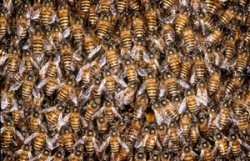Swarm Causes Engine Surge, 11-Hour Delay
 Instead of Tatoo
shouting, "Da plane, da plane!" from Fantasy Island, he could have
been yelling, "Da bees, da bees" this bankers' holiday weekend in
England.
Instead of Tatoo
shouting, "Da plane, da plane!" from Fantasy Island, he could have
been yelling, "Da bees, da bees" this bankers' holiday weekend in
England.
A swarm of bees, some 20,000 strong, was sucked into the engine
of a Palmair 737 which had departed Bournemouth International
Airport on the Southern English coast enroute to Faro, Portugal,
with 90 passengers aboard Thursday, reported UPI.
The pilot reported an engine surge about one hour into the
journey and returned on just one engine.
According to reports, the pilot reassured his frightened
passengers that the rattling noises they were hearing from the
plane's engine area was a simple case of "carburetor trouble."
Said one passenger, "There was this almighty bang. It all
happened so quickly. The staff remained very calm."
When the aircraft was checked by maintenance workers, Palmair
Managing Director David Skillicorn said the engine "looked as if
someone had shaken 1,000 cans of coke and sprayed them onto
it."
The bees got so far into the 737 that it took two attempts to
clean the engine.
"This was not life-threatening because they [bees] came out of
the back of the engine," Skillicorn said.
He added that bees flying into an aircraft's engine was an
extremely rare event and that the engines were designed to cope
with bird strikes.
Skillicorn said the bees were, um, buzzing, off of Britain's
Bournemouth coast prior to take off.
The bees, bee-lieve it or not, caused an 11-hour delay for
passengers while the company carried out repairs and eventually
replaced the aircraft.
An official from the British Pilots' Association said that the
last bee strike on an aircraft they could recall happened nine
years ago, which would explain why the pilot was confused as to the
reason for the problems with his engine.
An outbreak of bees at Tucson International Airport was reported by ANN last August when,
"for whatever reason, they (the bees) seem to like the smell of jet
fuel, and especially the yellow color of the Southwest airplane,"
said the senior director of operations at the
airport.
A total of 196 passengers were affected by the flight on
Thursday, with 90 attempting to continue their journey to the
Algarve and a further 106 waiting to return to the UK, reported The
Independent.
Could There Bee Recourse For Passengers?
Passengers affected by the bee problem -- for more than 11
hours-- could possibly receive compensation, reported the Dorset
Daily Echo.

Senior Palmair managers attempted to find a replacement plane
but were unsuccessful because all comparable craft were bringing
Liverpool fans back from the Champions League [UK football, soccer
to those in the US] final in Athens.
A plane from Luton finally took off at 7:15 pm and weary
passengers from Faro arrived back in Britain at 1:20 am.
Palmair's David Skillicorn said passengers had been "pretty
understanding when the situation had been explained to them."
"It sounds unbelievable that a swarm of bees could cause such
problems, but there was nothing we could do except make passengers
as comfortable as possible and provide vouchers twice for food and
refreshments."
"We had four staff at the airport throughout, talking to
passengers, and [we] will be writing to everyone affected giving a
clear explanation of what happened."
"Compensation is not due because the delay was caused by a
technical problem but I am still considering the matter."
"It couldn't have happened at a worse time, with the Bank
Holiday weekend and half-term coming up."
Unless a plane is more than half-way to its destination, the law
demands that an aircraft return to its UK base in such
circumstances.
 Aero-News: Quote of the Day (10.16.25)
Aero-News: Quote of the Day (10.16.25) Airborne 10.15.25: Phantom 3500 Confounds, Citation CJ3 Gen2 TC, True Blue Power
Airborne 10.15.25: Phantom 3500 Confounds, Citation CJ3 Gen2 TC, True Blue Power ANN's Daily Aero-Term (10.16.25): Enhanced Flight Vision System (EFVS)
ANN's Daily Aero-Term (10.16.25): Enhanced Flight Vision System (EFVS) True Blue Power and Mid-Continent Instruments and Avionics Power NBAA25 Coverage
True Blue Power and Mid-Continent Instruments and Avionics Power NBAA25 Coverage NTSB Final Report: Bellanca 17-30A
NTSB Final Report: Bellanca 17-30A



